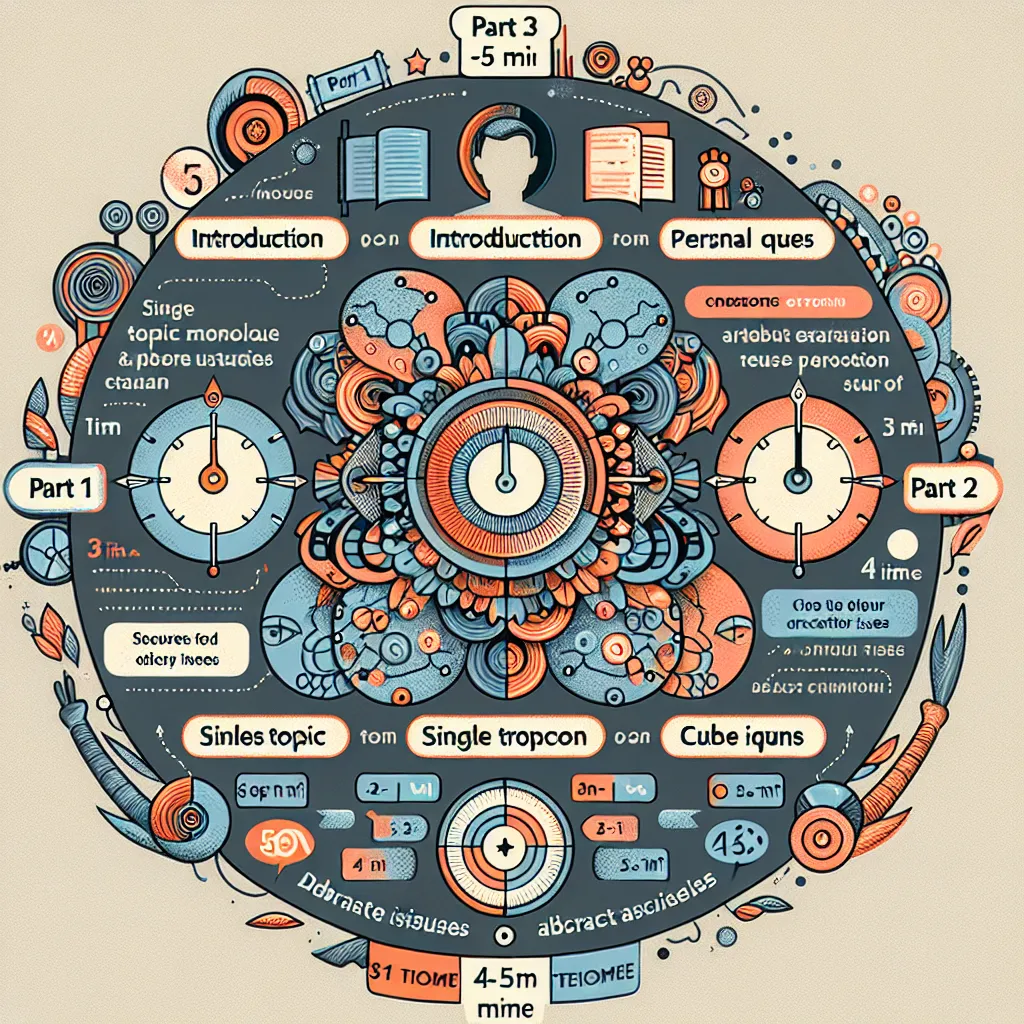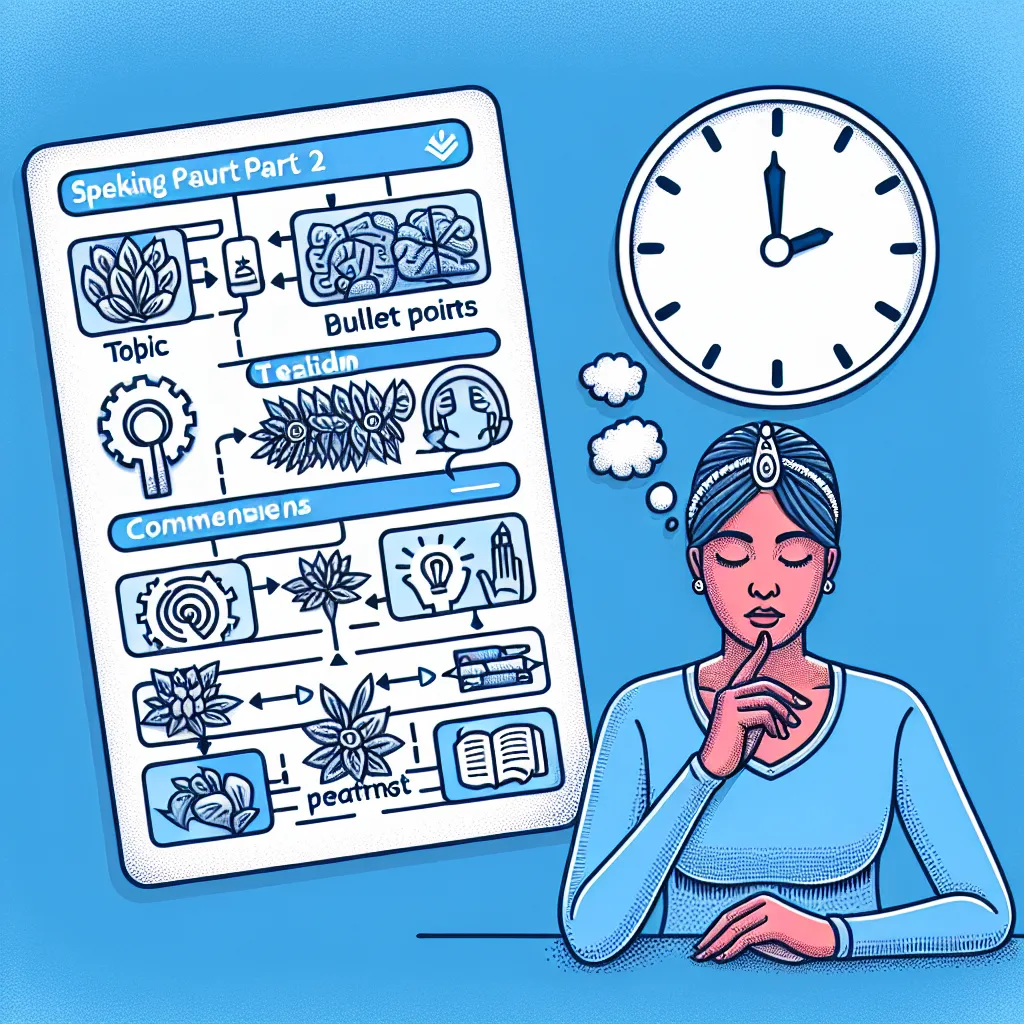Are you preparing for the IELTS Speaking test and wondering how to improve your performance? You’re not alone. Many test-takers struggle with common pitfalls that can impact their scores. In this comprehensive guide, we’ll explore expert strategies to help you avoid these mistakes and boost your confidence for the IELTS Speaking exam.
Understanding the IELTS Speaking Test
Before we delve into specific mistakes and how to avoid them, it’s crucial to understand the structure of the IELTS Speaking test. This knowledge forms the foundation for effective preparation and performance.
The Three Parts of the IELTS Speaking Test
- Part 1: Introduction and Interview (4-5 minutes)
- Part 2: Individual Long Turn (3-4 minutes)
- Part 3: Two-way Discussion (4-5 minutes)
Each part assesses different aspects of your speaking skills, and being aware of these can help you tailor your approach to avoid common mistakes.
 IELTS Speaking Test Structure
IELTS Speaking Test Structure
Common Mistakes in IELTS Speaking
Now, let’s explore the most frequent errors that candidates make and learn how to steer clear of them.
1. Lack of Fluency and Coherence
One of the biggest challenges for IELTS candidates is maintaining a smooth flow of speech. Hesitations, frequent pauses, and disjointed responses can significantly impact your score.
How to avoid it:
- Practice speaking English regularly, even if it’s just talking to yourself.
- Use linking words and phrases to connect your ideas smoothly.
- Develop the habit of expanding on your answers naturally.
2. Limited Vocabulary Range
Using basic or repetitive vocabulary can limit your ability to express complex ideas and may result in a lower band score.
How to avoid it:
- Learn new words and phrases daily, focusing on less common synonyms for everyday terms.
- Use idiomatic expressions appropriately to showcase language proficiency.
- Practice incorporating newly learned vocabulary into your speaking practice.
3. Grammatical Errors
While minor grammatical mistakes are expected, consistent errors can negatively affect your score.
How to avoid it:
- Review and practice using a variety of tenses and sentence structures.
- Pay attention to subject-verb agreement and word order.
- Listen to native speakers and try to emulate their grammatical patterns.
4. Poor Pronunciation and Intonation
Clear pronunciation and natural intonation are crucial for effective communication in the IELTS Speaking test.
How to avoid it:
- Focus on problematic sounds specific to your native language.
- Practice stress and intonation patterns in English.
- Use resources like pronunciation apps or work with a tutor to improve your accent.
5. Not Answering the Question Directly
Sometimes, candidates may go off-topic or fail to address the question asked, which can lead to lower scores.
How to avoid it:
- Listen carefully to the examiner’s questions.
- Structure your answers using the STAR method (Situation, Task, Action, Result) when appropriate.
- If you’re unsure about a question, politely ask for clarification.
6. Overuse of Memorized Phrases
While having a repertoire of useful phrases is helpful, overusing them or using them inappropriately can make your speech sound unnatural.
How to avoid it:
- Learn phrases in context rather than memorizing lists.
- Practice incorporating phrases naturally into your responses.
- Focus on understanding the meaning and appropriate usage of phrases.
 Common IELTS Speaking Mistakes
Common IELTS Speaking Mistakes
Strategies for Success in IELTS Speaking
Now that we’ve identified common mistakes, let’s look at some strategies to help you excel in your IELTS Speaking test.
1. Develop a Confident Mindset
Confidence plays a crucial role in your speaking performance. Remember, the examiner is there to assess your English skills, not to trick you.
Tips:
- Practice positive self-talk before and during the test.
- Prepare thoroughly to boost your confidence.
- Remember that it’s okay to make minor mistakes – focus on overall communication.
2. Expand Your Answers
One key to scoring well is providing detailed and well-developed responses.
Tips:
- Use the ‘rule of three’ – give three points or examples for each answer.
- Practice elaborating on your ideas with reasons and examples.
- Learn to use discourse markers to structure your extended responses.
3. Improve Your Pronunciation
Clear pronunciation is essential for effective communication in the IELTS Speaking test.
Tips:
- Focus on word stress and sentence intonation.
- Practice tongue twisters to improve specific sound pronunciations.
- Record yourself speaking and analyze areas for improvement.
4. Enhance Your Vocabulary
A rich vocabulary allows you to express your ideas more precisely and impressively.
Tips:
- Learn new words in context through reading and listening.
- Use a thesaurus to find more sophisticated alternatives for common words.
- Practice using new vocabulary in your speaking exercises.
5. Master IELTS Speaking Strategies
Familiarize yourself with specific strategies for each part of the IELTS Speaking test.
Tips for Part 1:
- Give short but complete answers.
- Be prepared to talk about familiar topics like your home, work, or studies.
Tips for Part 2:
- Use the one-minute preparation time effectively to structure your response.
- Include all the points mentioned in the cue card.
Tips for Part 3:
- Express and justify your opinions on more abstract topics.
- Use examples to support your arguments.
Conclusion
Avoiding common mistakes in IELTS Speaking requires awareness, preparation, and practice. By focusing on fluency, vocabulary, grammar, pronunciation, and relevant answering techniques, you can significantly improve your performance. Remember, the key to success lies in consistent practice and a positive attitude.
We encourage you to implement these strategies in your IELTS preparation. Share your experiences or ask questions in the comments below. For more IELTS tips and resources, check out our other articles on IELTS Writing Tips and IELTS Listening Strategies.




